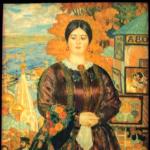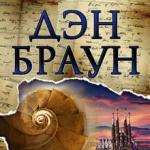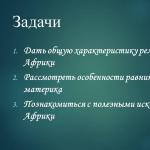The imagination of Soviet parents truly knew no bounds. But all new names and derived forms can be divided into several groups.
Geographical names and seasons
You could also choose a name based on your month of birth: December, Noyabrina, Sentyabrina, Fevralin, Aprelina. Well, those whom she called October were especially lucky.
Often parents were inspired by rivers, cities and mountains. The children were given names: Neva, Cairo, Lima, Paris, Himalaya, Altai, Angara, Ural and even Avksoma - Moscow in reverse.
In film " dog's heart“The girls’ names were chosen at a general meeting. (pinterest.ru)
Nature and resources
A child born in the USSR could easily be christened Oak, Birch, Azalea, Alder or Carnation.
Mathematics, physics, chemistry and technology
Science, which was developing at an active pace, suggested good names to parents: Algebrina, Ampere, Hypotenuse, Netta (from “net”), Drezina, Om, Electrina, Elina (electrification + industrialization). Minerals and chemical elements: Granite, Ruby, Radium, Tungsten, Helium, Argent, Iridium.
Slogans
Of course, what Soviet Union without slogans, in honor of which children were given abbreviated names:
Dazvsemir - from “Long live the world revolution!”
Dazdranagon - from “Long live the people of Honduras!”
Dazdraperma - from “Long live the First of May!”
Dazdrasmygda - from “Long live the bond between city and village!”
Dazdrasen - from “Long live the Seventh of November!”
Dalis - from “Long live Lenin and Stalin!”
Damir (a) - from the slogans “Give us a world revolution!”, “Long live world revolution" or "Long live the world."
Dasdges - from “Long live the builders of the DneproHES!”
Division - from an abbreviation of the slogan “Lenin’s cause lives on.”
Deleor - from "Lenin's Case - October Revolution."
Demir - from the abbreviation of the slogan “Give us a world revolution!”

May Day slogan. (pinterest.ru)
Revolutionary ideology and professions
The Russian language owes the revolution many new words and concepts that have become firmly entrenched in everyday life. Ideology became another source of inspiration for finding names for your children: the boy could very well get the name:
Avtodor - from the abbreviated name of the “Society for the Promotion of Motorism and Road Improvement.”
Agitprop - from the abbreviated name (until 1934) of the Department of Agitation and Propaganda under the Central Committee of the All-Union Communist Party (Bolsheviks).
Barricade (female version of the name - Barricade).
A fighter - from fighters for the just cause of the revolution and more.
Voenmor - from the abbreviation of the phrase “military sailor”.
Leader - everything is clear here.
Glasp - presumably from “glasnost press”.
Karmiy, Karmiya - from the abbreviation of the name Red Army
Kid - from the abbreviation of the phrase "communist ideal."
Kim - from the name of the organization Communist Youth International.
Kravasil - (The Red Army is the strongest)
Kukutsapol - from an abbreviation of the slogan during the reign of N. S. Khrushchev “Corn is the queen of fields.”
National - from the abbreviation of the word international.
Pyachegod is an abbreviation for the slogan “Five-year plan in four years!”
Revvol - from the abbreviation of the phrase “revolutionary will”.
Revdar - from the abbreviation of the phrase “revolutionary gift”.
Sickle-I-Molot is a compound name; from the Soviet heraldic emblem.
Women's names often repeated men's names, but with the addition of the letter "a" at the end. There were also original ones:
Kommunera - from the abbreviation of the phrase communist era.
Spark - from common noun(that's what they call main character Boris Vasiliev's story "Tomorrow there was a war").
Laila - from the abbreviation of the phrase “Ilyich’s light bulb”.
Lucia - from Revolution.
Victory is from a common noun.
Holidays - from the abbreviation of the phrase “holiday of Soviet power.”
Revvola - from the abbreviation of the phrase “revolutionary wave”.
Leaders, revolutionary figures and heroes of the USSR
Revolutionary figures, leaders and “ordinary heroes” of the USSR provided, perhaps, the most abundant soil for new names. As a rule, they were made up of the first letters of the first name and last name, or from the last names of several people, and sometimes it was a last name + slogan:
Bestreva - from the abbreviation of the phrase “Beria - Guardian of the Revolution.”
Bukharin - from the surname of N.I. Bukharin.
Budyon - from the surname of S. M. Budyonny.
Valterperzhenka - from the abbreviation of the phrase “Valentina Tereshkova - the first female cosmonaut.”
Dzerzh - named after F. E. Dzerzhinsky.
Dzefa - from the surname and given name Dzerzhinsky, Felix.
Kollontai - from the name of the party and statesman Alexandra Kollontai.
Ledat - from Lev Davidovich Trotsky.
Malice (Mels) is an abbreviation for the surnames Marx, Engels, Lenin and Stalin.
In the movie "Hipsters" main character ends up in a Komsomol court after dropping the last letter of his name.

Hipster Mel. (pinterest.ru)
Niserkha - from the abbreviation of the first, patronymic and surname Nikita Sergeevich Khrushchev.
Ordzhonika - from the surname of G.K. Ordzhonikidze.
Yurgoz - Yuri Gagarin orbited the Earth.
Lenin
The names that were based on the name of Lenin stood out:
Varlen - Grand Army Lenin
Vidlen - from the abbreviation of the phrase “great ideas of Lenin.
Vil (a) - from the initials of the first name, patronymic and surname Vladimir Ilyich Lenin.
Vilen (a) is short for Vladimir Ilyich Lenin.
Vilenor - from the abbreviation of the slogan “V. I. Lenin is the father of the revolution.”
Vilian - from the abbreviation of the phrase “V. I. Lenin and the Academy of Sciences.”
Vilivs - from the initials of the first name, patronymic and surname of Vladimir Ilyich Lenin and Joseph Vissarionovich Stalin.
Vilik - Vladimir Ilyich Lenin and Communism.
Vilich is an abbreviation for the first and patronymic name Vladimir Ilyich.
Vilyur (a) - the name has several decoding options: from the abbreviation of the phrases “Vladimir Ilyich loves the workers”, “Vladimir Ilyich loves Russia” or “Vladimir Ilyich loves the Motherland”.
Vinun - from an abbreviation of the slogan “Vladimir Ilyich will never die.”
Zamvil - from the abbreviation of the phrase “deputy of V.I. Lenin.”
Idlen - from the abbreviation of the phrase “Lenin’s ideas”.
Izail, Izil - from the abbreviation of the phrase “executor of Ilyich’s covenants.”
Lelyud - from an abbreviation of the slogan “Lenin loves children.”
Lengenmir - from the abbreviation of the slogan “Lenin is the genius of the world.”
Lennor (a), Lenora - from an abbreviation of the slogan “Lenin is our weapon.”
Ninel - from the reverse reading of the surname Lenin.
Plinta - from the abbreviation of the phrase “Lenin’s party and the people’s labor army.”
Sometimes others, no less relatives and friends, were placed next to Lenin. to the Soviet man, names (some of which, however, were later called traitors):
Lentrobukh - from the abbreviation of the surnames Lenin, Trotsky, Bukharin.
Lentrosh - from the abbreviation of the surnames Lenin, Trotsky, Shaumyan.
Forest - from the first letters of the surnames Lenin and Stalin.
Lestak - from an abbreviation of the slogan “Lenin, Stalin, communism!”
Lestaber - from the first letters of the surnames Lenin, Stalin, Beria.
Stalin
The number of names formed on behalf of Stalin is significantly less than similar ones - from Lenin. However, they all sound loud:
Stalber - from an abbreviation of the surnames Stalin and Beria.
Stalen - from the abbreviation of the surnames Stalin, Lenin.
Stalenberia - from the abbreviation Stalin, Lenin, Beria.
Stalenita - from the abbreviation of the surnames Stalin, Lenin.
Stalet - from the abbreviation of the surnames Stalin, Lenin, Trotsky.
Staliv - from the abbreviation of the surname and initials Stalin I.V.
Stalik - from the surname of I.V. Stalin.
Stalin - also named after Stalin.

Actress Irina Cherichenko as Iskra Polyakova in the film “Tomorrow there was a war.” (pinterest.ru)
Borrowed names
It has become quite popular to name children after foreign heroes related either to the cause of the revolution or to art and science. So, in the USSR, girls began to appear named Angela (in honor of the American human rights activist Angela Davis), Zarema (a borrowed name, which was attributed with the meaning “for the revolution of the world”), Rosa (in honor), Klara - like Zetkin. The boys were named John or Jonrid (after the writer), Hume - in honor of the philosopher David Hume, Ravel (as the French composer Maurice Ravel) or Ernst - in honor of the German communist Ernst Thälmann.
|
||||||||||
Use in cinema
- Mels is the main character of the Russian film "Hipsters".
see also
Write a review about the article "Mels"
Notes
Excerpt characterizing Mels
“I can’t tell your Majesty at what time the battle began from the front, but in Dürenstein, where I was, the army began the attack at 6 o’clock in the evening,” said Bolkonsky, perking up and at the same time assuming that he would be able to present what was already ready in his in his head a true description of everything he knew and saw.But the emperor smiled and interrupted him:
- How many miles?
- From where and to where, Your Majesty?
– From Durenstein to Krems?
- Three and a half miles, Your Majesty.
-Have the French left the left bank?
“As the scouts reported, the last ones crossed on rafts that night.
– Is there enough fodder in Krems?
– The fodder was not delivered in that quantity...
The Emperor interrupted him.
– At what time was General Schmit killed?...
- At seven o'clock, I think.
- At 7:00. Very sad! Very sad!
The Emperor said his thanks and bowed. Prince Andrei came out and was immediately surrounded on all sides by courtiers. Kind eyes looked at him from all sides and gentle words were heard. Yesterday's adjutant reproached him for not staying at the palace and offered him his home. The Minister of War approached, congratulating him on the Order of Maria Theresa, 3rd class, which the Emperor had bestowed upon him. The Empress's chamberlain invited him to see Her Majesty. The Archduchess also wanted to see him. He didn’t know who to answer, and took a few seconds to collect his thoughts. The Russian envoy took him by the shoulder, took him to the window and began to talk to him.
The film "Hipsters" was released in 2008. It tells about the lifestyle of the subculture of admirers of the Western lifestyle among the Soviet “golden youth” that emerged after the death of leader Joseph Stalin.
According to the plot, a Komsomol member and the son of a Great Patriotic War veteran, Mels Biryukov (played by Anton Shagin), after one of the raids on dudes, falls in love with one of them, Polina (played by Oksana Akinshina), who is known among “her friends” as Benefit. Then he decides to join the dudes, their informal leader Fred helps him get comfortable in their environment. For this, Mels is expelled from the Komsomol, and later he, together with Polina, himself becomes a victim of a Komsomol raid, led by Katya, who is in love with Mels. Then Polina becomes pregnant, but... not from her lover, and gives birth to a black child. She explains his appearance rather strangely, saying that she met an African-American man, in whom she saw a person from another world. Mels accepts the child, just like his father. And in the final scene, the young people walk down the street, where they are symbolically joined by representatives of modern subcultures. In general, a kind of version of Romeo and Juliet with a happy ending.
The film has a distinctly anti-Soviet orientation. All the furnishings and clothes of ordinary citizens are shown in an unsightly gray color, while the dudes and their party places are in bright colors. In connection with this, a review of this film was published on the website of the St. Petersburg branch of the Communist Party of the Russian Federation (http://cprfspb.ru/1026.html ).
However, let's look at some details of the film. It begins with the scene of the Komsomol raid and the meeting of Mels with Benefit. And then the story of the father of the future “convert” dude is shown. He is a participant in the Great Patriotic War and has awards. Returning to my communal apartment, I saw my two sons sitting by the window. And at this time, their mother and his wife copulate with her lover. The father-soldier takes the only correct action in such a situation - he throws both out the door with their things without unnecessary sentimentality. And then she raises her sons on her own. It is symbolic that a portrait of Stalin hangs over the children waiting for their father, that is, they are drawn to the image of the Leader of the People and “the friend of all Soviet children,” protecting themselves from the prodigal mother.
That is, Mels' mother is an ordinary whore. And most likely, in Benefit he saw his mother, for whom he apparently missed. Oedipus complex. By the way, it is no coincidence that she is called Benefit, since among the dudes, she is also a whore. True, not simple, but elite, as follows from Fred’s story. She doesn't let dudes near her. And Mels manages to win her sympathy only by learning to play the saxophone, about which below.
But the prodigal essence of Benefit is shown especially clearly in her story about how she gave birth to a black child. Morally depressed Mels heard a fantastic story about his appearance: “Well, just imagine, a man came from another planet for a few hours. And there is so much to ask about them, so much to tell about us, and the minutes are ticking and ticking. And soon there will be a return rocket. And we both know we'll never see each other again.(A slight smile from the sweet taste of vice. How subtly Akinshina played!) Is this what you wanted to hear? Satisfied?"
Indeed, Mels, what did you actually expect from the reincarnation of your prodigal mother? Honestly, I have never heard a more ridiculous excuse for a whore. But she could honestly admit that sex with a black American raised her self-esteem as a harlot in her lifestyle to cosmic heights. After all, other friends among the dudes never dreamed of this. And she began to feel like a kind of queen of whores. Remember, at the end of the USSR there was a popular song with the words: “American Boy, I’ll go with you! Moscow, goodbye!? Our superpower collapsed to this cheerful song!
But a whore will never admit who she really is. He will imagine himself as either a victim or a queen, a lover as a knight on a white horse, and a husband, if he has one, and his own father as a despot or a nonentity. And she pretends to be a caring mother when Fred comes to visit, which Mels expressed in the words: “Polina believes that if men and women have equal rights, I should also breastfeed the child.” She even named her black child Ivan in honor of her deceased father! It seems like she justified herself to herself that, they say, she honors his memory. But given the history of the birth of her child, this looks more like mockery. She even assures her mother, who was expelled from work and received a “wolf ticket” through her fault, that she needs her, and she, in response, did not even look at the prodigal daughter, because Benefit did not heed her warnings, preferring the title of whore “queen” . But Katya quite rightly called Polza a prostitute and a fashionable litter. But Mels did not want to listen to her.
The saxophone in the film is shown as a strong symbol of the Western way of life. It was impossible to buy this musical instrument legally at that time. But for Benefit, the saxophone has an even greater and even sacred meaning. Notice that Mels, while learning to play it, imagines an African American against the backdrop of New York skyscrapers. And Polza, seeing Mels playing on stage, in fact, looked with loving eyes not at him at all, but at the saxophone, which reminded her of the very African American whom she managed to drag into bed. It is typical that Fred, upon seeing Benza’s child, even joked to Mel that he “listened to Charlie Parker too often.”
But the trouble is, none of the male part of the “golden youth” would wish for themselves such “happiness” as a well-fed black child. For the careers of their parents, and their own, in the Soviet state, where Stalin’s “cult of personality” had not yet been condemned, could be in jeopardy (which is what happened to Polza’s mother). And abortion was still prohibited. But the simple-minded Mels, who lives in a communal apartment, was just right as a foster father. That's what "love" is all about. And for the sake of such “love” our “hero” betrayed the Komsomol organization, the ideals of the Soviet system, his father, who at one time expelled his harlot wife, and even the leader Soviet people Joseph Stalin. Among the dudes, he shortens his name Mels (Marx-Engels-Lenin-Stalin) to “Mel” in the American manner, which Katya tells him in the film, expelling our “hero” from the Komsomol. And fear is clearly visible in his eyes when he hears the name Stalin. As a result, he was left with a whore bride and a black child. Beauty! The logical result of his narrow-mindedness.
The parents of the main characters are shown interestingly. Benefit's mother is, apparently, a party worker who tries to put her daughter in her place with screams and hysterics, but runs into insurmountable resistance. The father, according to the story, died ten years ago. But Mels’s father, who raised two sons without a mother, does not in any way interfere with his son’s hobbies, even despite the persuasion of his younger brother. But he gave him the name Mels, that is, he was a convinced communist and, moreover, a Stalinist soldier. However, the father apparently understood that if he tries to guide his son on the right path with admonitions or aggression, he will finally betray him and will keep in his heart a connection with the prodigal mother, which will have the most fatal impact on his life. Therefore, he takes a wait-and-see attitude, expecting that his son will learn from his mistakes, as he himself learned in his time. It is characteristic that he quickly finds the “Kama Sutra” given to Mels by Fred, although he strictly forbade him to show it to anyone.
True, there is one important detail in the film: when the father returns from the front, there is a portrait of Stalin hanging in his room, but when his now grown sons are doing exercises, there is no portrait. That is, the fact that the eldest son took a crooked path is partly his father’s fault. Later, the thesis that in the Great Patriotic War the people won in spite of Stalin, together with other factors they persuaded Soviet people to the betrayal of their historical path, which led to the tragedy of the collapse of the Soviet Union.
After Fred, whom his father sent for an internship in the USA, brought Mels-Mel the terrible news that there were no dudes overseas, our “hero” acted like a hysterical woman: he refused to believe and brought down his anger on the “messenger” who brought bad news. However, he still has the opportunity to learn the cruel lesson he learned from life, and his soldier father will probably still play his role.




